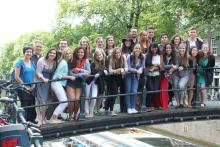The act of riding a bicycle might not ordinarily seem the best way to learn about social control, but a group of LSJ students in Amsterdam this summer discovered otherwise.
In Amsterdam, bicycles are the preferred mode of transportation, and they far outnumber cars. The LSJ students all rented bikes for their four-week study abroad course, and worked to master the formal and informal rules of the road. The Dutch, they learned, are not shy about educating those who do not comport with the norms.
The bicycles also provided the students an opportunity to simply enjoy the city and to consider the meaning of their experiences there. “Bicycling through the beautiful streets of Amsterdam I reflected on the importance of personally bearing witness to different peoples and their ways of life,” said LSJ major Andreas Hewitt.
The course, overseen by Professor Steve Herbert, challenged the 22 students to compare social control practices in Amsterdam with those in Seattle. In the process, the students were asked to consider how Dutch and American society compare and contrast.
“Studying abroad in Amsterdam was truly a transformative experience; I gained a new perspective from which to view the world and grew as a person,” said LSJ major Laura Martin. “Spending an entire month in the city gave me a chance to try on a completely different lifestyle and allowed for the time to learn the subtler dynamics of this new environment. With the knowledge I acquired of my surroundings, I am able to think more critically about the social, political and economic construction and problems of the United States.”
The students spent their days attending lectures at the University of Amsterdam and going on several field trips, including a walking tour of the Red Light District led by a former sex worker. The students also each completed a field project. Because they had done a similar field project in Seattle, they were able to compare the social control practices in each society.
“I learned that American norms of social organization are not global, and that there are valuable lessons to be gleaned from opening your eyes and ears in an environment different from one's own,” said Hewitt. “I came away from my month in Amsterdam with an appreciation for the Dutch sense of social pragmatism and egalitarianism, but also a renewed awareness of the merits of life in Seattle. In the years ahead, my time in Amsterdam will serve as a constant reminder to me that there are multiple ways to address pressing social issues, and that looking for inspiration from different cultures can be incredibly insightful when crafting social policy.”
Martin had a similar experience.
“The insights from my time in Amsterdam have spawned a more inquisitive outlook in myself and I am eager to apply this inquisitiveness in analyzing and challenging the social constructs around me,” she said. “The experience of navigating and finding my own path in an unfamiliar society has also helped my self-confidence a great deal.”
For his part, Herbert was deeply impressed by the energy of the students and the degree to which they supported each other.
“It is always a challenge to keep a group of students unified around a common purpose, particularly in a foreign setting,” he said. “But this group was supportive of each other, and remarkably inquisitive. I enjoyed being with them very much.”
Part of the challenge of riding those bicycles was avoiding the prospect of losing one’s way. With Amsterdam’s narrow, winding and often-discontinuous streets, this was a tough challenge. But perhaps it was not really a problem, according to LSJ major Caitlin Foster.
“Never have I been so lost in a city and been genuinely happy about it,” she said. “The city is special – really special. The culture and atmosphere are enlightening and surprising, with the energy of the people, boats, and bikes so high that it’s electrifying.”
